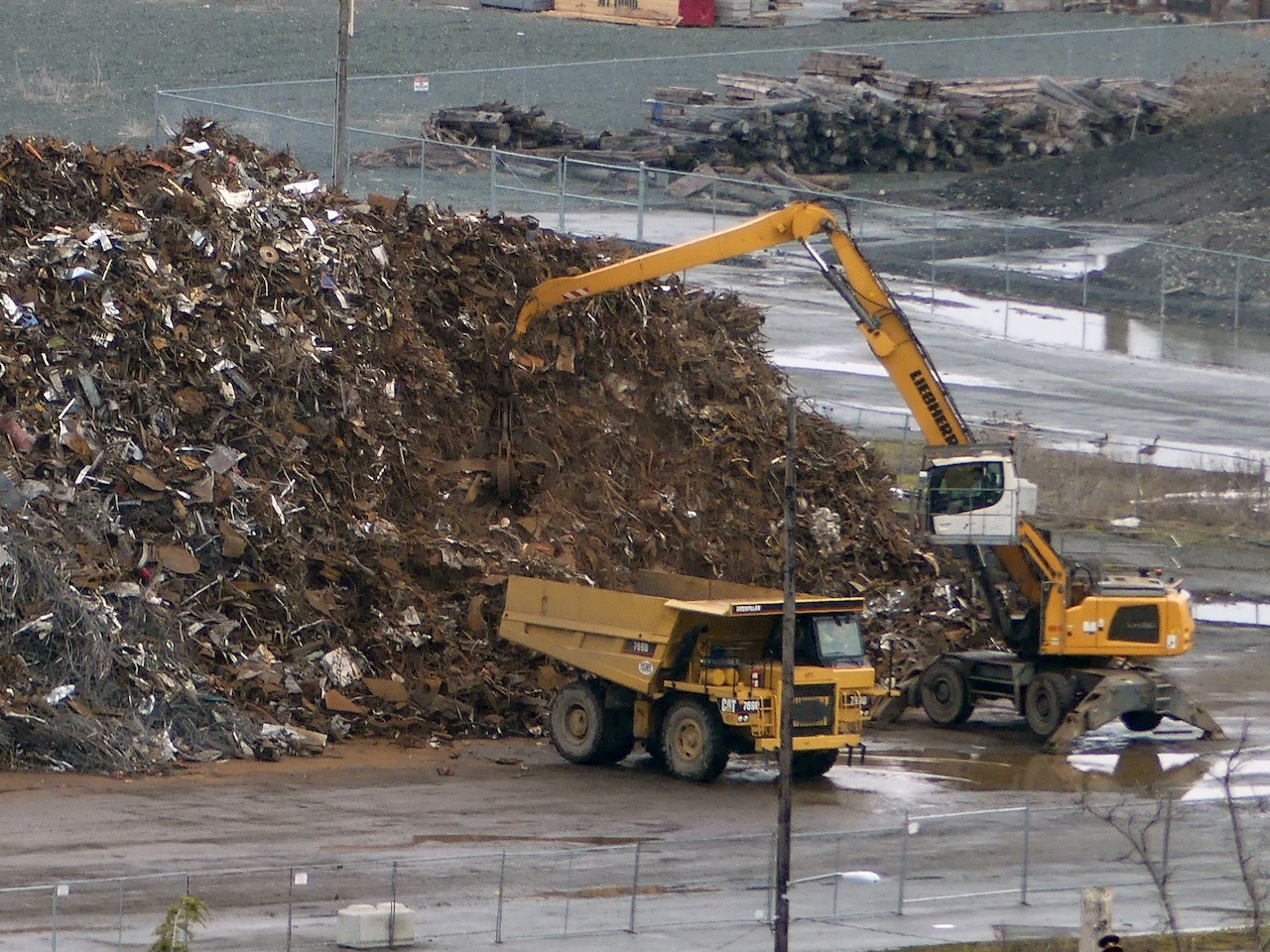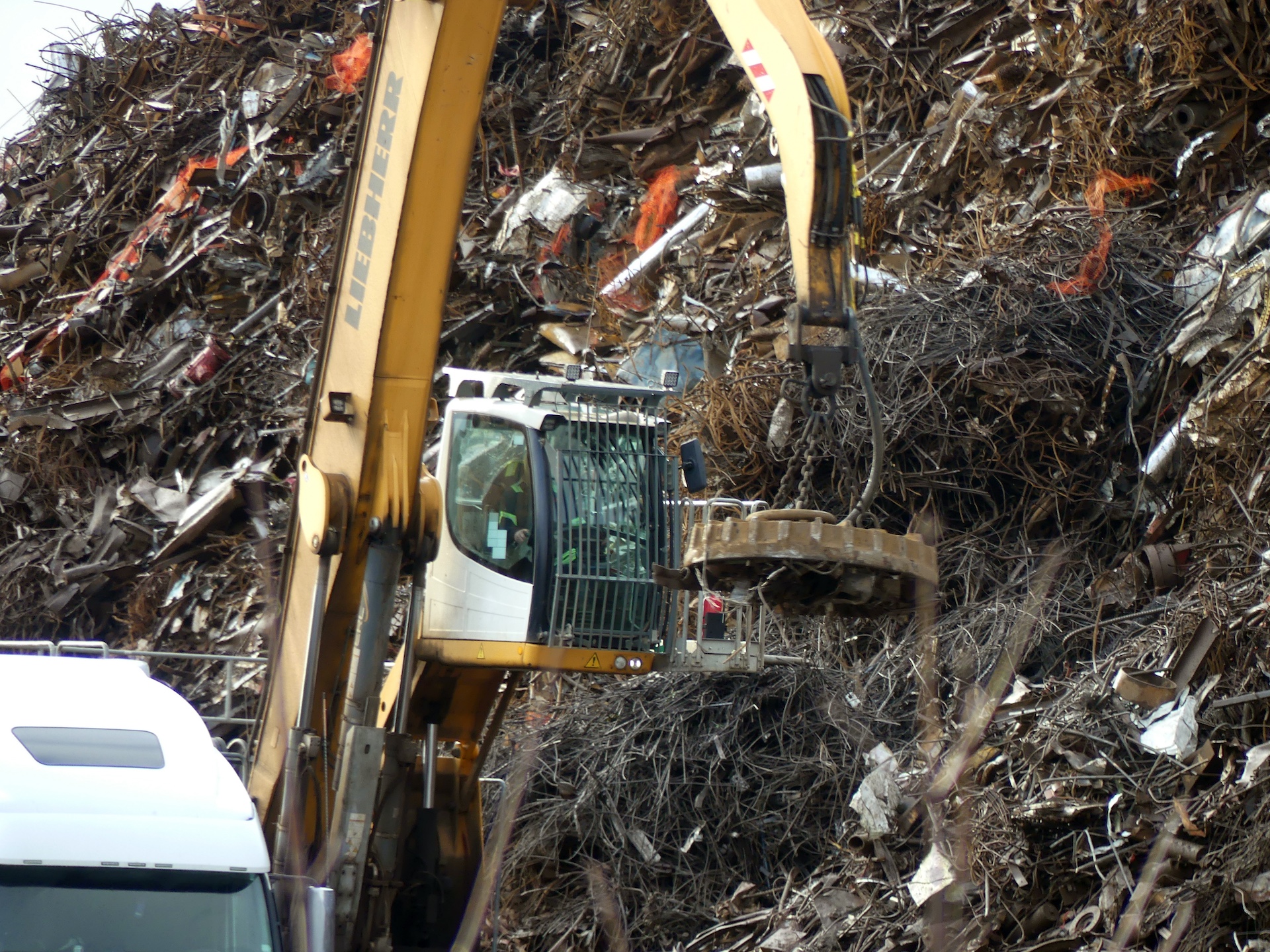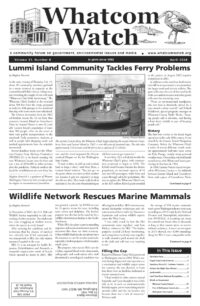by Scott Jones
Bellingham should be deeply concerned for its future. In a world where corporate interests all too often supersede public interests, Bellingham in many ways was moving in a different direction. Wages are increasing for all, renters are obtaining important rights for safety and costs, and the city and Port of Bellingham are making strides to reduce the area’s impact on the environment.
Bellingham was transitioning from a polluted industrial era to a future of secure family-wage employment featuring a thriving, maritime-centered working waterfront that poses no harm to the local ecosystem. Our waterfront was being cleaned up, ready for a diverse economy that would employ and sleep hundreds if not thousands of employees and residents. Waterways were being restored to their original form for the benefit of endangered species.
With the promise of the waterfront, residents, the city and the Port of Bellingham created a huge opportunity for the community. Hundreds of acres of prime real estate ready to be planned and built, for the future. One that would allow for diversity of residents, industry and economy. With the Granary, Mill Works, Board Mill and condominium buildouts, along with protected maritime trades, it was happening.
Secretive Purchase
Then ABC Recycling, in two simple actions, put that all at risk. Neither residents of Bellingham, nor Whatcom knew about the secretive purchase of 20 acres in Alderwood [Bellingham UGA], in April 2021. Through a deal exposed in a subsequent recycling newsletter, we found that ABC began executing its plans for an industrial metal shredder. Then, a consent agenda vote by the port in June of 2022 sealed the deal, with a 25-year lease to place a multistory, 6-acre, pile of scrap metal in the middle of the developing waterfront.
The community and Waterfront District had not planned for shredded old cars and appliances, piled three stories tall and hundreds of feet long. Where lead and other heavy metal would leach into the Bellingham Bay, and dust plumes would blow toward the new YMCA day care. This is an industrial activity, leased by the port to occur for 25 years that was never reviewed for environmental impacts nor accepted to be a part of the new developing waterfront.
Yet here it is. With the lease for the metal pile and the land purchase for the shredder, ABC’s plans of using Bellingham for profit are materializing. Why didn’t the city ask questions? Why didn’t environmental groups appeal under the State Environmental Policy Act? Because no one opposing the activity knew until it was too late. It all comes down to intent and ABC’s intent is very clear. ABC intends to use Bellingham as an industrial hub for profit, while the intent for the Waterfront District by the Port of Bellingham and the City of Bellingham was broken.
An Unexpected Addition
Many residents first heard about the heavy industrial ABC operation in the wee hours of the morning in October 2022. The metal piles had been building over the summer to monstrous proportions and ABC finally found a buyer in South Asia. Working from 7 a.m. until 3 a.m. in the morning, the metal is loudly loaded (dump truck load by dump truck load) by long-arm excavators. After the several-minute trip to the Shipping Terminal, the metal crashes down onto the dock in front of four cranes attached to the ship. While a bulldozer scrapes the dock to contain the pile, the ship’s cranes pick and dump scrap into the hull of the ship.
Each of the five steps includes a crash that is disturbing miles away. From Columbia and Lettered streets to Sehome and South Hill, the character and frequency of the crashing metal is so unbearable that hundreds if not thousands of residents cannot sleep for 10-day stretches at a time. One of the affected residents, Grace, age 9, falls asleep from exhaustion at 11 p.m., and has difficulty in school when the ship is in. The port and city are aware that the Center for Disease Control has recognized nighttime noise that disrupts sleep as causing significant health issues. While they have worked successfully to reduce noise from trains traveling through the city, they now have a more significant health issue to solve.
A few of the facts are as follows. As a Canadian company with operations solely in British Columbia, ABC Recycling sources 75 percent of its metal from within the province. It is delivered to Bellingham by truck from the mainland and by barge from Nanaimo. A proposed metal shredder nearby in the Alderwood neighborhood could bring shredded metal (and toxic residue and heavy metal pollution) by truck through Bellingham neighborhoods to the metal pile. The metal is ferrous (magnetic), so steel and iron, as well as any “hitchhiking” heavy metals, such as lead, have been found in the port water discharge. The ship takes 8-10 days to load. The metal is currently stored at the waterfront for months as it waits to be sold and shipped. ABC intends to grow into a massive company, with a 300 percent increase in company revenue over the next seven years. Finally, as it is a heavy industrial activity, without mitigation, the metal storage is not an approved activity under the Sub-Area Plan.
ABC’s planned metal shredder in the Alderwood neighborhood expands and compounds the problem. The toxic residue and heavy metal pollution, now evident at the port, would also be released to the Alderwood neighborhood through shredding operations. Trucks shipping the metal from Alderwood to the port would spread the toxic dust through Bellingham neighborhoods enroute.
Creation of “Save The Waterfront”
Independently, worried citizens began looking into ABC Recycling, the metal pile, and how it came to be at the waterfront. Deep concerns began to grow over the coming months, as tales of red dust plumes floated toward the Granary, and over the Container Village food court where outdoor restaurants served food to residents. Those concerns were confirmed when the Department of Ecology issued violations in April of 2023 to the Port of Bellingham and ABC Recycling due to exceedances of lead, zinc and copper being emitted into the Bellingham Bay.
Save The Waterfront, a local organization, was born from these concerns and by those worried residents. Questions were asked. Was an environmental review completed as is law, per the State Environmental Policy Act? Was a heavy industrial activity such as the Metal Pile in the center of the waterfront allowed at such an opportune location, ripe for residential, business, and marine/light industrial activity? Did it fit into the intent of the Waterfront Sub-Area Plan? Were there other unknown dangers? Where was the metal coming from? What was in the metal? How often would ships come? Why did the port seek out or even allow for such an unplanned, extremely long, lease in the center of the Waterfront District? Who at the city knew?
Since its inception, Save The Waterfront.org, has informed residents about its research through its website, supported a reasonable moratorium at the county level (received 1,300 signatures against the shredder and 700 against the metal pile), hosted community meetings, passed out thousands of fliers, delivered hundreds of yard signs, written tens of articles, worked with city, county and state lawmakers, and coordinated the community against a system that naturally allows for industry and profit. Save The Waterfront has also raised over $50,000 for a legal fund to fight the toxic industrial activity at both the port and the proposed shredder location.
Land Use Subverted
The Waterfront District is a complex and long-planned development, with a planning history of almost 20 years. We are just now embarking on a 20-year buildout of the Urban Village. Goals and a result (if successful) are mostly set in place. To speed up the process, state and city leaders created a Planned Action Ordinance. Through Land Use Ordinances within the Bellingham Municipal Code, the Comprehensive Waterfront District Sub-Area Plan, and parallel Environmental Impact Statements (EIS), the Planned Action Ordinance allowed specific types of projects to be reviewed for environmental impacts and accepted before they are fully envisioned, planned or permitted. These allowed activities include residential housing, hotels and restaurants in the mixed use portion (north), and light industrial, working waterfront activities, and city parks in the light industrial area (south).
To benefit the historic and important activities of a working waterfront, land use was specifically designated to allow activities such as “aquaculture, barge loading facility, boat/ship building, boat repair, dry dock, net repair, seafood processing, cargo terminal, [and] web house” (BMC 20.37.420).
Some activities that did not fit the agreed upon Sub-Area Plan were to be allowed, but with conditions to mitigate any negative effects on the community or the environment. Some activities such as automobile wrecking, and heavy industrial activities, were not allowed at all.
Barge Loading of Boulders
ABC’s long-term storage of the massive waste metal pile is a subversion of our waterfront’s planned land use. The light industrial activity, “Barge Loading Terminal,” is a permitted use at the Waterfront Shipping Terminal. Barges are currently permitted to load boulders and logs at the Port Shipping Terminal for delivery to Oregon’s coast. ABC Recycling inappropriately used “Barge Loading of Boulders” at the Shipping Terminal as the needed comparison to allow for the heavy industrial storage of large scrap metal piles.
There are no similarities between the two. The boulders are shipped on small barges, while the scrap metal is not loaded on barges at all but instead on very large ocean going vessels destined for foreign ports. The scrap metal contains pollutants, and is possibly dangerous with a risk of fire, while the boulders are not. The boulders are stored at the Shipping Terminal where they are loaded. The metal is stored at a separate location referred to as the Log Pond and must be transported by truck from the storage area to the Shipping Terminal before it can be loaded.
ABC Recycling effectively bypassed all environmental review and requirements for mitigation by claiming the storage of scrap metal at a separate storage area is the same as loading boulders onto small barges at the Port Shipping Terminal. Through this obfuscation, ABC Recycling was able to bypass Conditional Use Permit requirements for a metal recycling storage activity, and, in so doing, thwarted the law and required environmental review, foiled the intent of the City of Bellingham, and dismantled the Port of Bellingham Waterfront Plan.
Compromise With Industry
The Planned Action Ordinance allows for other activities not specified in the waterfront Sub-Area Plan if they mitigate negative social and environmental impacts through a Conditional Use Permit process. Collection and storage of recyclable metals from outside the Waterfront District is one such activity. The Planned Action Ordinance could allow this activity provided air, water and noise pollution were minimized per Bellingham Municipal Code, by fully enclosing the activity and discontinuing work by 7 p.m. Reasonable, codified into law, and agreed to requirements.
Subjugated Environmental Review
Washington’s State Environmental Policy Act (SEPA) requires a SEPA checklist and review whenever a project “activity” or “permit” occurs that could have environmental impacts. The intent for these triggers are so that new activities that could harm the natural environment or the community are known and mitigated to reduce or negate the harm.
The first trigger for a SEPA review would have been the signing of the lease by the port. The Port of Bellingham (the SEPA agent) chose to not complete a SEPA checklist, and, as the lease was an unknown event by the general public or by city leaders, the appeals process expired by early July 2022.
As the “barge loading terminal” Land Use at the metal pile bypassed the condition of an enclosure, no permit occurred and thus the usual requirement of a SEPA through a building permit was not triggered.
The Department of Ecology has required that ABC Recycling obtain a stormwater permit for its operations due to a “significant” change in activity at the Log Pond, the storage location. The requirement for a stormwater permit also triggers a SEPA. ABC Recycling has been in violation of this requirement since starting operations in the summer of 2022, and, per state law, should not have begun operations until the permit was in place.
It was not until December 2023 that ABC Recycling complied with the law and filed an application for a stormwater permit. In their application, ABC continued to demand that they are exempt from any environmental review. Save The Waterfront has pushed back through a letter-writing campaign from hundreds of residents. We hope for a decision soon by the Department of Ecology. SEPA is intended to not only review the environmental impact of the permit, such as stormwater; it is also intended to look wholly at the activity, which should include cumulative offsite environmental and community impacts such as the trucking through town or even the metal shredder a few miles to the north.
Throughout this process, since June of 2022, ABC Recycling has used inappropriate land use claims to bypass mitigation of their heavy industrial activities resulting in damage to our community.
The Wizard Behind the Curtain
As the Wizard of Oz said, “Pay no attention to that man behind the curtain,” the fallacy that allows ABC to operate in Bellingham is falling apart. At the City Council meeting January 8, ABC’s representative, Riley Sweeney, spoke about noise emanating from the metal pile as if it wasn’t the responsibility of the company he is employed by. ABC should have been aware that it is not allowed to make bothersome industrial noise after 10 p.m. per BMC 10.24.120.
C.4. []…industrial noises… in residentially zoned areas, between the hours of 10:00 p.m. and 7:00 a.m., which unreasonably disturb or interfere with the peace, comfort and repose of others.
To cut their losses, ABC has said they will voluntarily cease operations at midnight. To choose how greatly they break Bellingham law is not ABC’s privilege. Returning to Grace’s experience, and hundreds of other students in the area, midnight does them no good. Their sleep is deeply and unhealthfully disturbed. Even 10 p.m is still too late, but better than midnight or 3 a.m.
Which is why the land use of a Recycling Collection Center is the correct use for such a disturbing activity to so many, where work stops at a reasonable hour of 7 p.m. The city aimed, through law, to prevent the recurring disruptive metallic noises emanating from a recycling facility at the waterfront after 7 p.m., considering the proximity to neighborhoods older than the port, and the thousands of residents in the area. Law is not to be thwarted for reasons of profit.
Must the Activity Be Permitted?
Yes. For a planned urban village such as the Bellingham Waterfront, a “Permitted” activity holds important meaning. To be permitted, it must meet the expectations of the Waterfront District Sub-Area Plan, follow the Land Use definitions of the Bellingham Municipal Code 20.37.420, be an activity that was analyzed between 2008 and 2019 under the Environmental Impact Statements, and steps must be taken under the Planned Action Ordinance.
As we have seen above, the metal storage does not fit with the expectations of the Sub-Area Plan due to its heavy industrial nature (BMC 20.36.020), has not been mitigated under the correct definition of Bellingham’s Land Use code, does not meet its current land use designation, and has not been approved or analyzed under the waterfront environmental permitting process.
Even though the project should not have been allowed in the first place, let’s move on to the final question. Was the appropriate process completed for the metal storage to be accepted under the required Planned Action Ordinance? The answer to that question is “no.” For the activity to be “Permitted” at the waterfront under any land use, the City of Bellingham must issue a determination of consistency (BMC 16.30.160.C) and communicate that determination to surrounding neighbors and neighborhood associations.
The city has confirmed that there is no determination on file, nor were neighbors and neighborhoods informed as required.
In state, county and city law, process and intent are important. They are to be followed and recognized for the benefit of the people and the environment.
Where Does This Leave Bellingham?
It leaves our Waterfront District with a heavy industrial activity, Storage of Scrap Metal, that is not allowed. It leaves Bellingham with a blight that, by law and by the intent of the City of Bellingham, should not be here at all or at least should be extremely mitigated. It leaves Bellingham fighting for a sustainable waterfront, an incredibly important opportunity that meets the long-term intent of our city leaders and our community. It leaves Bellingham with a single dirty industry that might employ 16 people instead of a sustainable working waterfront that could employ hundreds more in fishing, light industry, maritime service, technology, construction, retail, food service, entertainment and tourism.
Following the law and its required process does not expire, nor ABC’s responsibility to do so. ABC Recycling’s responsibility is to follow the law and file for a Conditional Use Permit under Bellingham Municipal Code 20.37.420 (F)(12) and 20.16.020(L)(2) as a Recycling Collection and Processing Center. As well, they must follow the process of the Planned Action Ordinance to continue work. Save The Waterfront intends to hold ABC Recycling accountable to that responsibility.
_____________________
Scott Jones, a resident of Bellingham since 2010, is a founding member of Save The Waterfront. He is an advocate for true affordable housing, food security, and a good quality of life for all residents of Bellingham and Whatcom County. Professionally, as the founder of Beyond Clothing, Scott designs technical outdoor apparel, and helps develop American Made manufacturing.






























